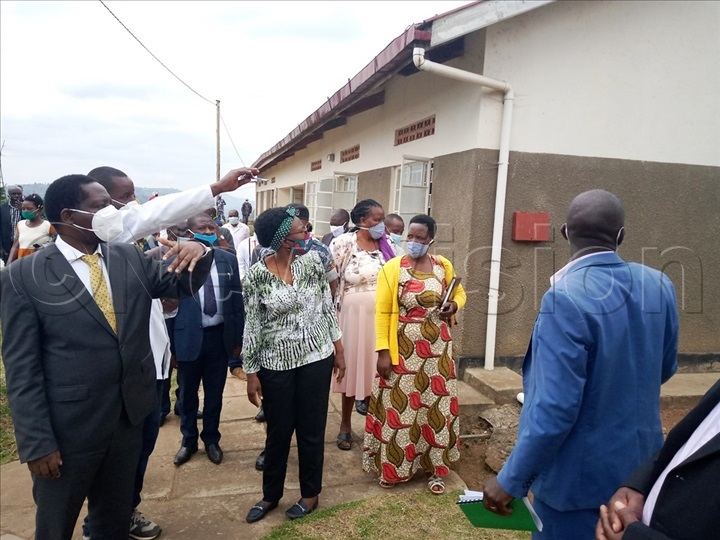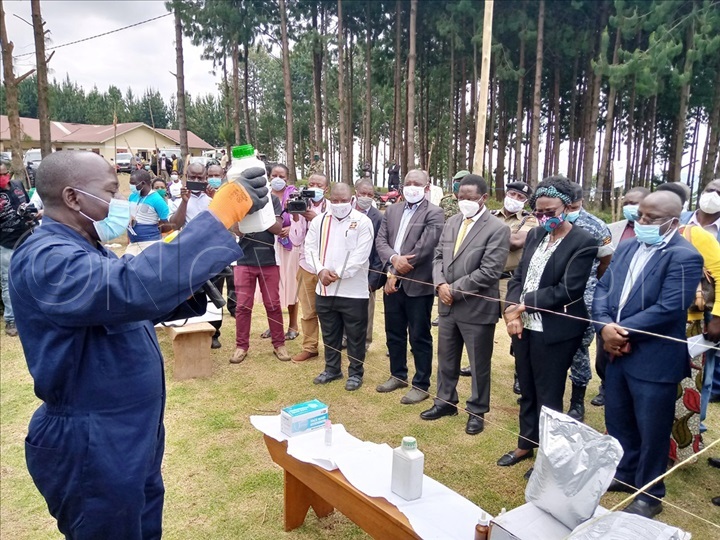Health ministry unveils new approach to fight malaria
Jun 21, 2020
Through larviciding, experts will be applying specially treated green materials to places where mosquitoes breed from and once the insects feed on the medicne, they will die immediately.

The Ministry of Health has rolled out a new intervention to fight the spread of malaria in Uganda.
The Larviciding approach towards the control of malaria was on Friday launched by Dr. Jane Ruth Aceng, the mealth minister at Butanda Health Centre III in Butanda sub-county, Kabale district.
According to Aceng, through larviciding, experts will be applying specially treated green materials to places where mosquitoes breed from and once the insects feed on the medicne, they will die immediately.
"We have been trying this approach for the last 12 years and our experiments have proved that it is a safe way of dealing with mosquitoes. The approach kills immature forms of the mosquito, thus reducing the risk of malaria transmission," said Aceng.
The minister credited the government of Egypt for supporting Uganda in introducing this system of malaria prevention.
"President Yoweri Museveni had been so concerned about the rising cases of malaria in the country and in one of his visits to Egypt, he was introduced to larviciding as one of the approaches. The President then asked the Egyptian government to help introduce this here and they accepted to support us," revealed Aceng.
Egypt then sent Dr. Muhammed Ali, to introduce the mechanism to Uganda.
"Dr. Muhammed started training our staff on the new approach and he helped us to do some experiments to ascertain the reliability of the method. We never wanted to lose our fish while fighting mosquitoes," she added.

Aceng noted that Kigezi region was not known for malaria. However, in 1990 the Ministry of Health started registering cases of severe malaria in the region which called for urgent consideration.
In 1997, Museveni visited Kigezi and called for a serious intervention against malaria which had become a threat to human life.
"You see, unlike other regions that are used to malaria, here once one acquires it, the results become too hard to handle because the society is not so exposed to the disease. We, therefore, brought in mosquito nets, did spraying but all this has not helped much in fighting the problem as desired," said Aceng.
She asked the locals to continue protecting themselves against the disease despite the new intervention rolled out by the ministry.
David Bahati, the state minister for finance in charge of planning who doubles as the Ndorwa West legislator, hailed the ministry for its endless efforts in fighting malaria which is one of the most serious diseases affecting Ugandans.
"We understand the pressure that the ministry is encountering nowadays but the commitment to fight malaria indicates how serious they are concerned about the wellbeing of Ugandans," he said.
Dr. Alfred Mubangizi, the assistant commissioner for vector control in the Ministry of Health noted that the new approach against malaria comes at a time when mosquitoes were becoming so resistant to some of the existing insecticides in the country.
He noted that the intervention will be exercised in the three districts of Kabale, Rubanda and Kisoro before it is introduced to the rest of the country.

Patrick Besigye Keihwa, the Kabale district chairperson, said that despite the various approaches against malaria, the ministry needs to focus highly on sensitisation of the masses on best practices against the disease.
"We still have members of our community who will receive mosquito nets and use them to rear chicken. Such people will always let us down even when we do our best to deal with the problem at hand," said Keihwa.
Keihwa also called for more staffing in health centres and provision of accommodation for health workers to improve service delivery in the sector.
